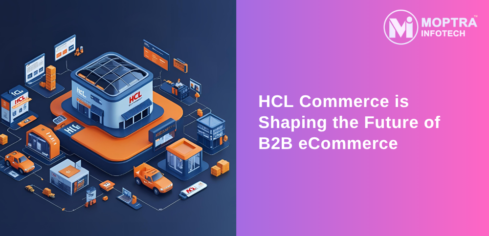in the dynamic landscape of B2B eCommerce, enterprise buyers are demanding the same speed, personalization, and experience they receive in B2C. As a result, businesses are being pushed to adopt platforms that are not only scalable but built for complex transactions and rapid innovation.
Enter HCL Commerce—a robust enterprise commerce platform that’s redefining how B2B companies engage, convert, and retain customers.
1. B2B Commerce Is Evolving—Fast
According to Gartner, 80% of B2B sales interactions between suppliers and buyers will occur in digital channels by 2025. And McKinsey reports that 77% of B2B decision-makers are willing to spend $50,000 or more on a single purchase through digital self-service channels.
This rapid evolution demands platforms that can:
- Handle complex catalogs and pricing models.
- Integrate with ERP, CRM, and supply chain systems.
- Provide real-time personalization and customer-specific experiences.
2. Why HCL Commerce? A Future-Ready Platform
HCL Commerce (formerly IBM WebSphere Commerce) is purpose-built for enterprises that require performance, scalability, and flexibility. Here’s what sets it apart:
a. Composable Architecture for Agility
HCL Commerce follows a headless, API-first, cloud-native architecture—exactly what modern B2B businesses need to quickly build and iterate on custom buyer experiences.
“Composable commerce enables you to choose best-of-breed solutions and stitch them together to meet unique business needs.” — Gartner, 2024
With HCL Commerce’s support for composable commerce, enterprises gain faster time-to-market, continuous innovation, and reduced vendor lock-in.
b. Enterprise-Grade Performance
- Supports high transaction volumes across multiple geographies.
- Enables multi-site, multi-brand, and multi-language support.
- Handles complex B2B scenarios: contract pricing, customer hierarchies, and custom catalogs.
c. AI-Powered Personalization
HCL Commerce integrates with HCL Unica and other MarTech tools to deliver AI-driven, segment-specific content, pricing, and promotions—something that’s increasingly vital in B2B, where the average buying group includes 6–10 decision-makers.
d. Integrated B2B Features
Built-in tools for:
- Account-based management
- Quote negotiation
- Contract-based pricing
- Reorder and punch-out capabilities
These aren’t afterthoughts—they’re core features, reducing the need for heavy customizations.
3. Cloud-Native for Continuous Delivery
HCL Commerce runs on Kubernetes-based cloud infrastructure, which means:
- Faster updates with zero downtime.
- Scalability on demand (seasonal or event-driven spikes).
- Flexibility to deploy on-premise, public cloud, or hybrid models.
This aligns with IDC’s 2024 prediction that 80% of enterprises will shift to hybrid/multi-cloud strategies to reduce risk and improve agility.
4. Global Brands Trust HCL Commerce
Major enterprises like The North Face, Follett, and Sonepar rely on HCL Commerce to drive billions in global eCommerce revenue. These brands need reliability, scalability, and enterprise integrations—exactly what HCL delivers.
5. Real Business Outcomes
Case Study: Sonepar, a global B2B electrical distributor, implemented HCL Commerce and saw:
- Faster quote generation with contract-based pricing.
- Improved customer retention through tailored self-service portals.
- Revenue uplift via better product discovery and upselling.
(Source: HCL Commerce Case Studies 2024)
Final Word: Why HCL Commerce is the Future of B2B eCommerce
In an era where B2B buyers expect Amazon-like experiences but with enterprise-grade complexity, HCL Commerce emerges as the platform of choice. It combines legacy stability with modern flexibility, making it the best fit for large-scale B2B enterprises.
If your business is looking to:
- Future-proof its tech stack,
- Accelerate digital transformation,
- Or unify its global commerce operations,
HCL Commerce is not just a choice—it’s a strategic advantage.




Related Posts
Unleash Your Potential: Career...
Are you passionate about SAP Commerce and HCL Commerce? Looking for a company that values your skills and fosters your professiona...
In today’s digital age, ...
With the increasing use of smartphones and the internet, more and more people are turning to online shopping for their needs. As a...
Transforming Pharma Retail: Th...
The pharmaceutical retail landscape is evolving, and companies like Mercury Drug are embracing digital transformation to meet the ...